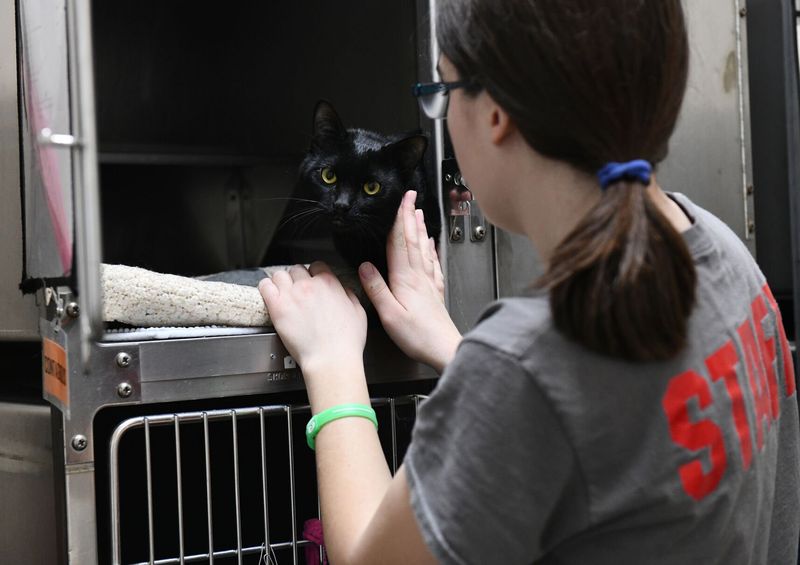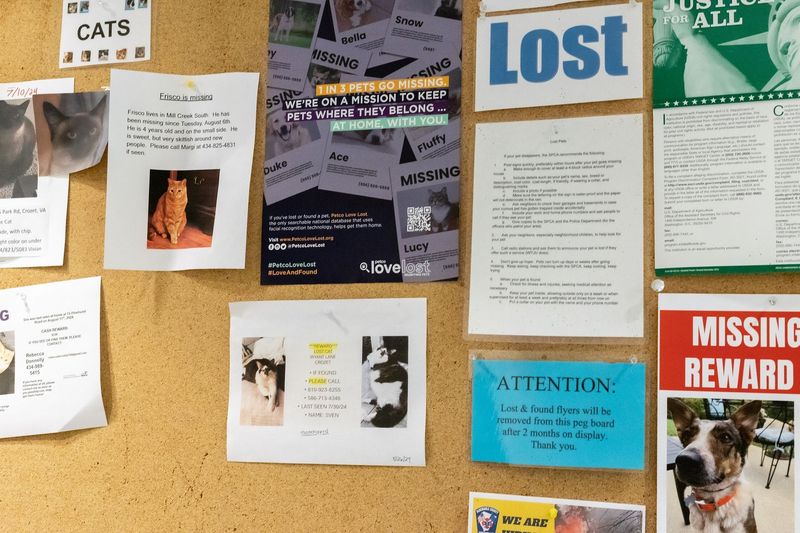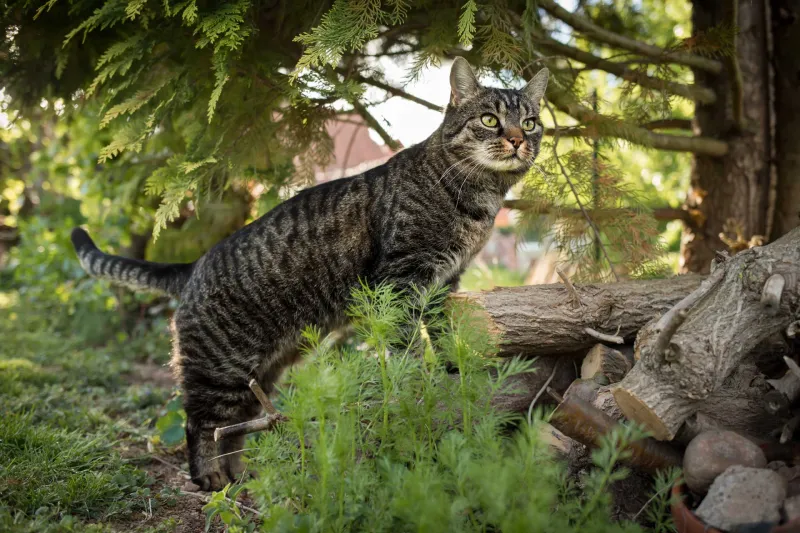18 Crucial Actions To Take When Your Cat Runs Away

Hey there, fellow cat parent! If your furry friend has decided to take an impromptu adventure, don’t panic. Cats often wander off on mini escapades and show up like nothing happened. Let’s explore some creative, effective actions you can take to bring your feline explorer back home safely.
Remember, your kitty’s curiosity might lead to unexpected hideouts and amusing scenarios. So, let’s make sure they return home in one piece!
1. The Power Of Familiar Scents

Ever thought about your cat’s superhero-like sense of smell? Cats can pick up on familiar scents from far away. Placing your kitty’s favorite blanket or toy outside could guide them home.
It’s like leaving a breadcrumb trail of comfort. Cats are drawn to scents they associate with safety and warmth. So, this simple trick can work wonders when your adventurous feline decides to roam.
2. Shake That Treat Bag

Got a noisy treat bag? Cats often can’t resist the sound of treats shaking. Head outside and give that bag a good shake. The unmistakable rustle might just lure your feline friend back.
Cats associate this sound with delicious rewards. And let’s be honest, who can resist a tasty snack? Your kitty’s ear twitch might just be the signal that they’re on their way back!
3. Post On Social Media

In today’s digital age, your community’s online groups can be a goldmine. Create a post with your cat’s photo and your contact info. The more eyes, the better!
Neighbors, friends, and even local animal lovers can help keep an eye out. You’ll be surprised by the kindness of strangers willing to assist in the search for your furry companion. It’s like a digital search party!
4. Flyers With Flair

Design a flyer that’s hard to ignore. Use bright colors, a clear photo, and bold text. Pin these up around the neighborhood. Think of it as a visual SOS.
People are more likely to notice eye-catching designs. Plus, adding a little humor or a fun fact about your cat might just make someone stop and take a closer look. Creativity wins attention!
5. Check Local Shelters

Animal shelters can be the first stop for found pets. Visit nearby shelters and leave your contact information. It’s like leaving a breadcrumb trail for your cat.
Many cats are turned in by well-meaning people who think they’re strays. Regular checks and keeping shelter staff informed can increase the chances of a happy reunion. Keep hope alive!
6. Search During Quiet Hours

When the world is hushed, cats feel safer to emerge. Search during early morning or late evening. Call out softly and listen for any meows in return. The quiet allows you to hear any subtle sounds.
It’s like turning the world into a whisper, making it easier for your cat to pick up on your presence. Patience and calmness are key here.
7. Use A Humane Trap

Humane traps can be lifesavers for capturing cautious cats. Set one up with some tempting food. It’s a waiting game, but many lost cats have been safely caught this way.
Make sure to check the trap regularly. It’s like setting a safe haven your cat can’t resist. This method combines patience with a touch of cleverness, ensuring your kitty returns unharmed.
8. Talk To Your Neighbors

Never underestimate the power of a good neighborly chat. Informing your neighbors about your lost cat can lead to unexpected sightings. They might have seen your kitty lounging in their yard.
Sharing this information turns your neighbors into allies. Plus, they might keep an eye out or even offer to help search. Community spirit can be a powerful force!
9. Check Hiding Spots

Cats are masters of hide and seek. Check under porches, in garages, and around bushes. These are tempting hideouts for a spooked feline. Think like a cat and explore those nooks and crannies.
It’s part detective work, part adventurer. Remember, your cat’s curiosity might lead them to the most unexpected places. Be thorough and maybe a little sneaky!
10. Leave Out Food And Water

A hungry cat is a motivated cat. Leaving out some food and water can entice your kitty back home. It’s a simple yet effective strategy. The aroma of their favorite meal can travel far, acting like a culinary beacon.
Just keep an eye on it, as it might attract more than just your feline friend. Feeding stations can be a cat’s homing signal.
11. Use Technology

In the era of smart gadgets, why not use technology to find your cat? GPS collars and pet tracking apps can be a game changer. These devices can pinpoint your cat’s location with surprising accuracy.
It’s like having a digital leash. Of course, this works best if the collar was on before they went on their adventure. Technology can be your best friend!
12. Consult A Pet Detective

Yes, pet detectives are a thing! These professionals specialize in locating lost pets. They bring experience and might spot clues you’ve overlooked. Hiring a pet detective adds expertise to your search efforts.
It’s like enlisting Sherlock Holmes for your kitty. They can provide strategies and tools you might never have considered. Sometimes, a fresh pair of eyes works wonders.
13. Utilize Community Boards

Local community boards are still a treasure trove of information. Post a notice about your missing cat at libraries, cafes, and community centers. It’s an old-school tactic that still works wonders.
Community boards gather all sorts of readers, increasing the chances of someone spotting your furry friend. The more you spread the word, the more help you’ll receive.
14. Use Your Cat’s Name

Calling out your cat’s name might sound obvious, but it’s crucial. Use your familiar tone and pitch. Your cat will recognize it, even from afar. It’s like a vocal security blanket for them.
They associate it with comfort and safety. Sometimes, the sound of your voice is all it takes to coax them out of their hiding spot. Keep calling, they might just be listening!
15. Record Your Voice

If calling out doesn’t work, try recording your voice. Play it on repeat near your home. Your cat might respond when things quiet down. The consistent sound of your voice could draw them in.
It’s like a siren song, leading them back. This method works particularly well when your cat is shy or scared. Patience is your ally here.
16. Explore With Caution

Venturing into unfamiliar territory can lead to success. Carefully explore woods, alleys, and open fields. Keep quiet and observant. It’s a little like being an explorer in a jungle, seeking out signs of your furry friend.
Unexpected places might just hide your adventurous kitty. Be patient and mindful of your surroundings. Sometimes, discovery lies just beyond your comfort zone.
17. Use A Familiar Sound

Cats react to familiar sounds like car keys jingling or a specific whistle. Use these to grab their attention. It’s a quirky strategy, but it works!
Cats have an incredible auditory memory and might associate a unique sound with you. This method adds a fun twist to your search efforts. You never know, a little jingle might be all it takes.
18. Keep The Faith

Lastly, never underestimate the power of hope. Cats are resilient and resourceful. Many have returned home after weeks or even months. Keep the faith and continue your efforts.
Your determination can make all the difference. Remember, your cat’s quirky spirit is matched only by your love and resolve. Stay positive and open to all possibilities. Your furry friend is worth it.






